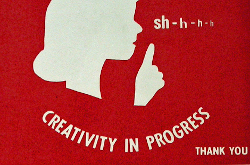혁신의 비결

Simply put, innovation is doing something new that works. Steven Johnson has written a new book called "The Innovator's Cookbook." Mr. Johnson says all progress depends on innovation and creativity. "There is no kind of occupation that can't be improved with innovative thinking."
Are there secrets to innovation? Mr. Johnson talked to a group of innovative people. They included businesspeople, software designers, artists and musicians. Among them was composer Brian Eno.
"One of the great things that he does is that when he sits down in the studio to start working on an album, he often has the band switch up their instruments."
So think of the drummer playing guitar and the keyboardist playing violin. How does it sound? Pretty bad at first, Mr. Eno admits. But he told Mr. Johnson that the process is liberating.
"They end up generating new sounds, new ways of playing together they wouldn't have gotten to otherwise. That's a great metaphor for what you want to do in your own life. Go and try things that you haven't tried before, and don't worry about sounding bad because what may happen is you're taken to some new place."
Being open to new things also helped IDO, a design and innovation company in California, to expand around the world. Mr. Johnson talked with IDO co-founder Tom Kelley for his book. Mr. Kelley described a weekly meeting, held every Monday morning, for the company's top managers.
"That meeting, for twenty years, has started with show and tell. People are asked to present interesting things they stumbled across that weekend. Someone would say, 'Hey, I went to see a movie with my kids last night' or 'You guys seen this new game my kids are playing?' or 'I went to an art gallery the other day and it's really interesting.'"
"Tom said it ends up triggering all these new associations and there is something unpredictable about it that leads to new ideas for their actual business."
Steven Johnson shares his interviews in "The Innovator's Cookbook." It also includes nine essays written by business researchers. These essays explore the conditions that can either allow creativity to grow, or kill it.
One of those essays is by Teresa Amabile, a Harvard Business School professor and co-author of the book "The Progress Principle."
"It is absolutely possible to kill creativity. In fact, it seems to be more common inside most workplaces for the work environment to undermine creativity, to kill it, rather than to stimulate it and keep it alive." In her essay, Professor Amabile offers guidelines for supporting innovation in the workplace.
"First of all, people need to feel that they have some degree of autonomy in what they are doing. They also need to feel personally involved in what they are doing, that they find it in some way interesting, satisfying, enjoyable and personally challenging."
"When people are in that mindset, they're much more likely to come up with new and useful ideas. People also need to feel, across the organization, they have encouragement for coming up with new ideas."
Innovator's Cookbook" author Steven Johnson says creative minds also need to work together, to collaborate.
"You think about Apple, Steve Jobs and Steve Wozniak founding that company. Very different people; a brilliant engineer and a brilliant visionary and salesman, two totally different kinds of minds, and they needed each other."
True. But author Susan Cain wrote recently that "If you look at how Mr. Wozniak got the work done -- the sheer hard work of creating something from nothing -- he did it alone. Late at night, all by himself."
Ms. Cain, writing in the New York Times, noted Mr. Wozniak's own words to would-be inventors: "I'm going to give you some advice that might be hard to take. That advice is: Work alone."
Susan Cain has just published a book called "Quiet: The Power of Introverts in a World That Can't Stop Talking." She wrote in the Times: "Most of us now work in teams, in offices without walls, for managers who prize people skills above all. Lone geniuses are out. Collaboration is in.
"But there's a problem with this view. Research strongly suggests that people are more creative when they enjoy privacy and freedom from interruption." In other words, there can be too many cooks in the innovator's kitchen.

